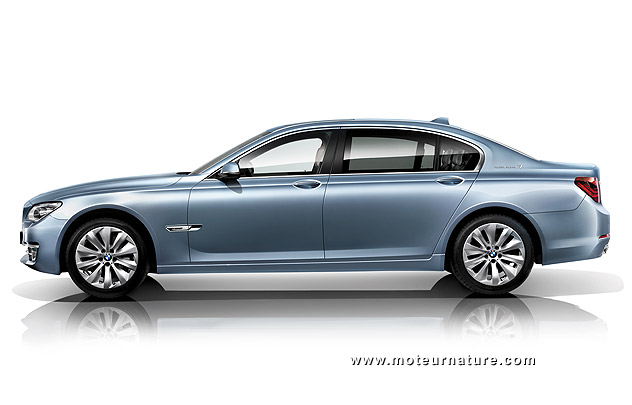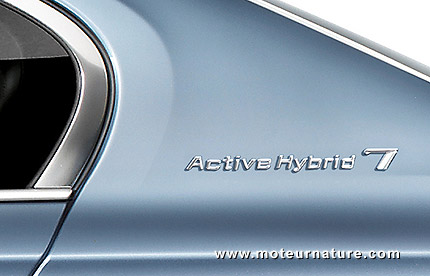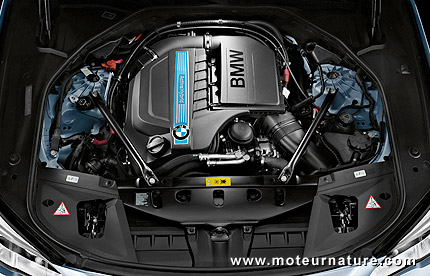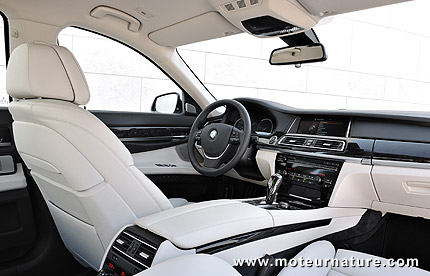
 Even for hardcore bimmer fans, it was difficult to speak enthusiastically of the BMW ActiveHybrid 7. Its drivetrain is a far cry from the silky smooth power delivery the hybrid Lexus LS offers. I can explain why: BMW chose the wrong architecture. All hybrids associate a gas engine and an electric motor, but the engine is so much more important in the ActiveHybrid 7. It’s a 449-hp V8 next to a tiny 15-kW electric motor. In a car weighing more 4500 lbs, driving in electric mode is totally out of the question. The gas engine only shuts down when the car is stopped, or about to stop.
Even for hardcore bimmer fans, it was difficult to speak enthusiastically of the BMW ActiveHybrid 7. Its drivetrain is a far cry from the silky smooth power delivery the hybrid Lexus LS offers. I can explain why: BMW chose the wrong architecture. All hybrids associate a gas engine and an electric motor, but the engine is so much more important in the ActiveHybrid 7. It’s a 449-hp V8 next to a tiny 15-kW electric motor. In a car weighing more 4500 lbs, driving in electric mode is totally out of the question. The gas engine only shuts down when the car is stopped, or about to stop.
 Recognizing the flawed architecture, the German engineers went back to work, and changed everything. They moved in the right direction, with a smaller gas engine and a bigger electric motor. The V8 is gone, replaced by a turbocharged 3-liter inline six. Power is down to 320 hp, but the electric motor has grown to 40 kW. With 155 lb-ft of torque, it’s now possible to drive at low speeds on battery power, though not for long (like in a Prius). The combined power is down, and acceleration suffers. 0 to 62-mph acceleration is down to 5.8 from 4.9 seconds, but that should still be adequate for most people, even demanding BMW drivers.
Recognizing the flawed architecture, the German engineers went back to work, and changed everything. They moved in the right direction, with a smaller gas engine and a bigger electric motor. The V8 is gone, replaced by a turbocharged 3-liter inline six. Power is down to 320 hp, but the electric motor has grown to 40 kW. With 155 lb-ft of torque, it’s now possible to drive at low speeds on battery power, though not for long (like in a Prius). The combined power is down, and acceleration suffers. 0 to 62-mph acceleration is down to 5.8 from 4.9 seconds, but that should still be adequate for most people, even demanding BMW drivers.
 More important, fuel consumption and CO2 are down by 35% by European measuring methods. That is big! Sure, hybrid cars buyers like performance, but fuel economy is what they’re after above all. The BMW ActiveHybrid 7 gets a 34 mpg combined rating on European testing, a good value for a luxury sedan this size. Americans will surely enjoy it, Europeans much less because we have diesel here. A 740d is a much more attractive proposition, with more performance, lower fuel consumption and CO2 emissions. We don’t know the price of this ActiveHybrid 7 yet, but the 740d will very probably be cheaper, and that makes the hybrid 7 Series a hard case for European motorists.
More important, fuel consumption and CO2 are down by 35% by European measuring methods. That is big! Sure, hybrid cars buyers like performance, but fuel economy is what they’re after above all. The BMW ActiveHybrid 7 gets a 34 mpg combined rating on European testing, a good value for a luxury sedan this size. Americans will surely enjoy it, Europeans much less because we have diesel here. A 740d is a much more attractive proposition, with more performance, lower fuel consumption and CO2 emissions. We don’t know the price of this ActiveHybrid 7 yet, but the 740d will very probably be cheaper, and that makes the hybrid 7 Series a hard case for European motorists.
We guess BMW should go all the way, and install in its big hybrid sedan, the small but excellent 4-cylinder turbo-diesel from the 520d. With a 120 kW electric motor and a 2 kWh battery, that would be a fantastic hybrid, beating anything from Lexus.